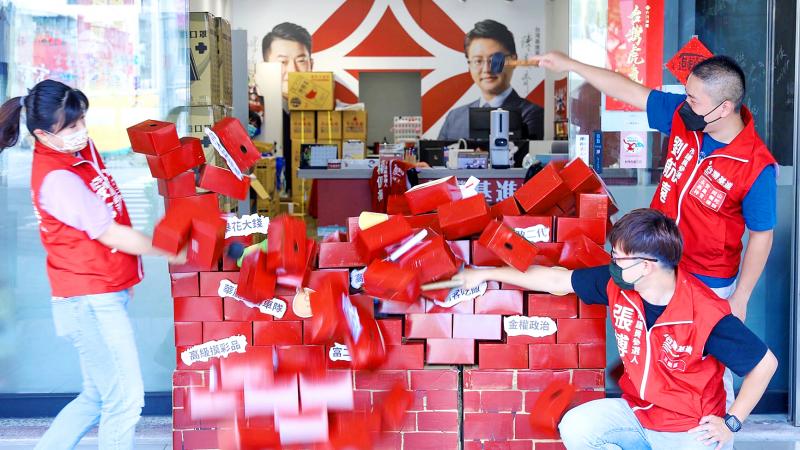The Taiwan Statebuilding Party on Thursday called for an end to “big money politics” and suggested limits on campaign spending for city and county councilor candidates in November’s local elections.
“We ask the government to enforce regulations to end ‘black gold’ influence in elections,” party official Chang Po-yang (張博洋) said at an event in Kaohsiung.
“Black gold” refers to the monetary influence of organized crime.

Photo: Wang Jung-hsiang, Taipei Times
For November’s city and county councilor elections, the party recommends a campaign spending cap of NT$3 million (US$101,163), Chang said, adding that parties should rely on idealistic young people and other volunteers to spread their messages.
Without spending constraints, Taiwanese politics is destined to become the exclusive domain of corporations, wealthy people, family dynasties and candidates with ties to organized crime, he said.
Media reported in 2018 that successful city council campaigns spent a minimum of NT$15 million, former party chief financial officer Chang Ting-ting (張婷婷) said.
“We even heard that one candidate for Kaohsiung City council in 2018 had spent NT$80 million,” she said. “That is an outrageous figure. A person could buy a luxury mansion in Taiwan for that money.”
Party executives and candidates at the event built a mock brick wall of cardboard and paper, with “bricks” displaying expensive campaign items such as promotions, television advertising, billboards, banquets, campaign trucks and brochure printing costs.
Party members took turns hammering bricks off the wall to represent knocking expensive items off of campaigns.
Wealthy people and powerful interests regularly spend more than NT$20 million to help a candidate win a seat, Chang Po-yang said, adding that councilors become more interested in helping donors recoup their “investment” rather than following up on promises.
“Big money” campaign funding has led to well-known scandals regarding office-assistant expenditures, and charges of fraud, bid-rigging and public-project embezzlement, he said.

‘DENIAL DEFENSE’: The US would increase its military presence with uncrewed ships, and submarines, while boosting defense in the Indo-Pacific, a Pete Hegseth memo said The US is reorienting its military strategy to focus primarily on deterring a potential Chinese invasion of Taiwan, a memo signed by US Secretary of Defense Pete Hegseth showed. The memo also called on Taiwan to increase its defense spending. The document, known as the “Interim National Defense Strategic Guidance,” was distributed this month and detailed the national defense plans of US President Donald Trump’s administration, an article in the Washington Post said on Saturday. It outlines how the US can prepare for a potential war with China and defend itself from threats in the “near abroad,” including Greenland and the Panama

A magnitude 4.9 earthquake struck off Tainan at 11:47am today, the Central Weather Administration (CWA) said. The hypocenter was 32.3km northeast of Tainan City Hall at a depth of 7.3km, CWA data showed. The intensity of the quake, which gauges the actual effect of a seismic event, measured 4 in Tainan and Chiayi County on Taiwan's seven-tier intensity scale, the data showed. The quake had an intensity of 3 in Chiayi City and County, and Yunlin County, while it was measured as 2 in Kaohsiung, Nantou County, Changhua County, Taitung County and offshore Penghu County, the data showed. There were no immediate reports of

The Chinese Nationalist Party (KMT) is maintaining close ties with Beijing, the Democratic Progressive Party (DPP) said yesterday, hours after a new round of Chinese military drills in the Taiwan Strait began. Political parties in a democracy have a responsibility to be loyal to the nation and defend its sovereignty, DPP spokesman Justin Wu (吳崢) told a news conference in Taipei. His comments came hours after Beijing announced via Chinese state media that the Chinese People’s Liberation Army’s Eastern Theater Command was holding large-scale drills simulating a multi-pronged attack on Taiwan. Contrary to the KMT’s claims that it is staunchly anti-communist, KMT Deputy

RESPONSE: The government would investigate incidents of Taiwanese entertainers in China promoting CCP propaganda online in contravention of the law, the source said Taiwanese entertainers living in China who are found to have contravened cross-strait regulations or collaborated with the Chinese Communist Party (CCP) could be subject to fines, a source said on Sunday. Several Taiwanese entertainers have posted on the social media platform Sina Weibo saying that Taiwan “must be returned” to China, and sharing news articles from Chinese state media. In response, the Mainland Affairs Council (MAC) has asked the Ministry of Culture to investigate whether the entertainers had contravened any laws, and asked for them to be questioned upon their return to Taiwan, an official familiar with the matter said. To curb repeated